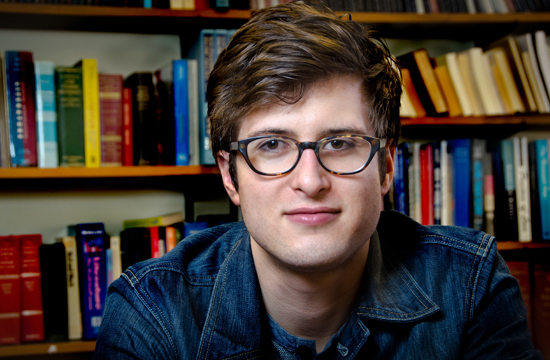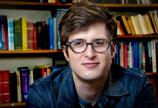Tye Landels awarded one of 10 prestigious 3M student fellowships
- Tara Sharpe

Tye Landels (English) is one of 10 undergraduate students across Canada receiving a 3M National Student Fellowship this year. On June 18, the third-year UVic honours student will journey to Kingston, ON to receive the prestigious award -- modelled after the long-standing 3M National Teaching Fellowships for university professors -- at an official ceremony at Queen's University as part of an annual national teaching-and-learning conference.
3M/STLHE News Release (PDF) | UVic News Release
Academic distinction in a variety of disciplines—from English and art history to urban planning and environmental studies—is only a small part of the story for this top scholar and community innovator.
As current president of the UVic English Students’ Association (ESA), Landels spearheaded change in the first weeks of his tenure, including galvanizing the membership to change the name from the ELITists to its current, more democratic name. He also made sure the department’s library was open to all Dept. of English students, not just those in the honours program.
As a research assistant for UVic’s Map of Early Modern London (MoEML), he set up encoding practices and standards for the constantly evolving digital encyclopedia.
As someone born with visual and hearing impairments, Landels has challenged preconceptions (including his own) about disability and disability culture; has helped organizations and offices such as CanAssist and the Canadian National Institute for the Blind; and has developed and advised on note-taking programs, academic policies and the use of audio-visual technology in the classroom.
3M - June 2014
The 3M National Student Fellowship, presented by 3M Canada in partnership with the Society for Teaching and Learning in Higher Education (STLHE), includes a $5,000 prize, as well as a trip to Kingston for the STLHE conference in June 2014.
The STLHE gathering includes the 3M awards ceremony and a full-day retreat for all 10 fellows to work on a collaborative project related to post-secondary education.
The Ring sat down last week to talk with Landels. Here are a few highlights from that discussion about his thoughts on being a student and community leader.
On learning from the heart
I went to the University of Waterloo in September 2010 for my first year of post-secondary education. It was a ‘misadventure.’
I was given the usual ‘scare line’ about there being no jobs in the humanities. So I bought into it and would’ve left there with a professional [urban planning] designation. I quickly realized I was in the wrong discipline altogether.
I returned home to Victoria and enrolled in Spring 2012 classes: English, philosophy and history in art. It was remarkable – probably the best four months of my life, academically and socially. This whole world of scholarship and knowledge opened up to me.
Post-secondary education is very formative. It’s where you develop into who you will be and want to be.
The so-called ‘attack on the humanities’ is something that absolutely undermines the most important things about what make us human, make our cultures interesting and what has led to the world as it is. If you want to make changes to the institutions and ideologies that inform our world, humanities is one of the avenues to do this.
On leadership
I do not see leadership as being embodied in a title or person.
Leadership manifests in action.
On transformational experiences
I now recognize that my identity as a person with physical disabilities allows me to approach systemic issues in my communities with a less privileged perspective.
I no longer think of myself as an outsider to a community, but as a valuable member and leader with often-interrelated communities and as an ally to other important communities.
The classroom has yet to become a fully accessible, egalitarian and safe learning environment for many underprivileged students. This is true not only for students with disabilities, but also for students who are ‘othered’ by their sexual orientation, gender, race, age or other unconforming positions from a very restrictive norm. Students and instructors must work together to challenge these prevailing norms and biases through affirmative programs, services, technology and education.
On his Honours thesis
I’m interested in theoretical approaches to Renaissance drama, specifically, Shakespeare's work.
What does it mean to engage with Shakespeare today? What's at stake now—and for Shakespeare to be included in the cultural dialogue for so long? We still read his plays, experience them, watch them. He's still here. And we can't experience pop culture without really leaving that code.
To future generations
Do the very thing that makes you the most fully realized person you can be.
We need to refocus the discussion on what undergraduate students can do.
And my answer is: ‘A lot!’
Photos
In this story
Keywords: 3M National Student Fellowship, student life
People: Tye Landels

